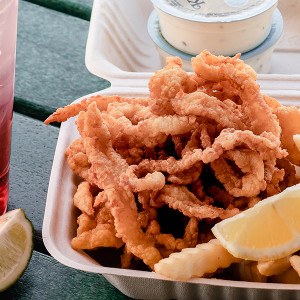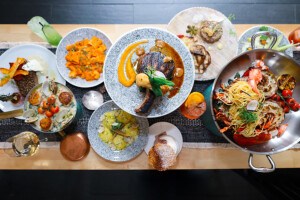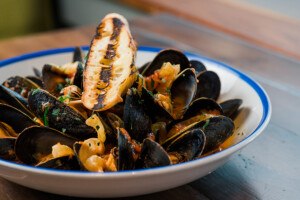Photos: Boston Local Food Festival 2013
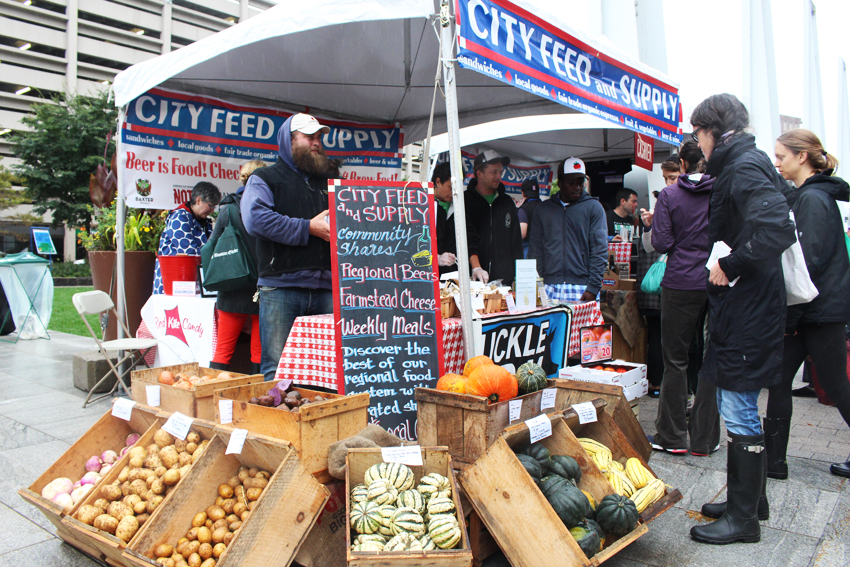
City Feed, a Boston grocery and café that supplies great local ingredients, doled out samples from some of their suppliers during the festival. (Photos by Margaret Burdge)
The rain couldn’t keep food lovers away from the Boston Local Food Festival yesterday, where area farms and restaurants brought some of Boston’s best locally grown produce and delicious craft seasonal dishes to the Rose Kennedy Greenway.
With interactive exhibits, cooking demos, a wide variety of vendors, and an abounding farmers market, the fourth annual Local Food Festival covered just about everything that goes into the agricultural community in New England. A zero-waste event (last year, 91 percent of waste was diverted from landfills), the festival highlighted the importance of supporting our local farmers for fresher food at a lower cost.
Couldn’t make it out yesterday? Check out some of the tips and tricks you missed:

Kip Kolesinskas from Eden Pond Farms was one of the presenters at the Chef Demo Stage sponsored by Northeast Flavor magazine. In Kolesinskas’s “Don’t Be a Chicken About Whole Chickens” presentation, he explained how to de-bone a whole chicken. “Everyone hates getting to the table and seeing that the other person’s piece is bigger,” joked Kolesinskas. His secret for perfectly event breasts: flip over the chicken so it is inside-up, locate the ridge of cartilage and the sternum that runs through the center of the piece, and drive the knife straight through the sternum. To remove the bone from there, cut around the bone, flip the piece, and the separation is clear.

At the Do-It-Yourself Demo Stage, experts gave an inside look at less-common ingredients and methods for a unique perspective on cooking local. Kimi Ceridon (above) gave a lesson on fermentation, offering the recipe for her kimchi, which was inspired by the Asian influence in her Hawaiian roots. During the course of the day, presentations were offered on the health benefits of wheatgrass, Caribbean and West African spices, gardening when you don’t have farmland, and the “culture” of kraut.

The Seafood Throwdown was a collaboration between the Northwest Atlantic Marine Alliance (NAMA) and the Cape Ann Farmers Market to spread the ecological and economical importance of locally caught seafood. The throwdown was a battle between teams from Boston Medical Center and Boston Children’s Hospital. The competition was especially relevant for the two competitors, as hospitals are one of the largest consumers of fish, making them an influential force in the industry. BMC and Boston Children’s are two of many local hospitals collaborating with NAMA to commit to purchasing only local fish, supporting local fishermen and keeping up with the national economy.

Red’s Best, a New Hampshire fishery, supplied the secret ingredients for the Seafood Throwdown, a local pollock (pictured above) cooked by the Boston Medical Center team, and the bluefish prepared by Boston Children’s Hospital chefs. Each team was given an “underloved” fish (one not marketed the way halibut or salmon are, but that is plentiful in local waters) to work with. They first had 20 minutes and $25 to collect ingredients in the farmers market, and then 45 minutes to beat the competition in cooking. For the first time in Throwdown history, the competition resulted in a tie, thanks to Boston Medical Center’s use of their entire fish by making homemade stock using the pollock bones, and Boston Children’s Hospital’s creative use of tangy cranberries and local vendor Georja’s flounder spice.

Wiches of Boston boasted “the freshest ice cream you will ever have,” with their liquid-nitrogen frozen ice cream, made on-site. The faster process beats more air into the milk, offering a creamier texture, almost like gelato. Wiches was brewing up a lightly salted caramel flavor topped with caramel corn, as well as a fresh mint flavor with dark-chocolate chunks at the festival.
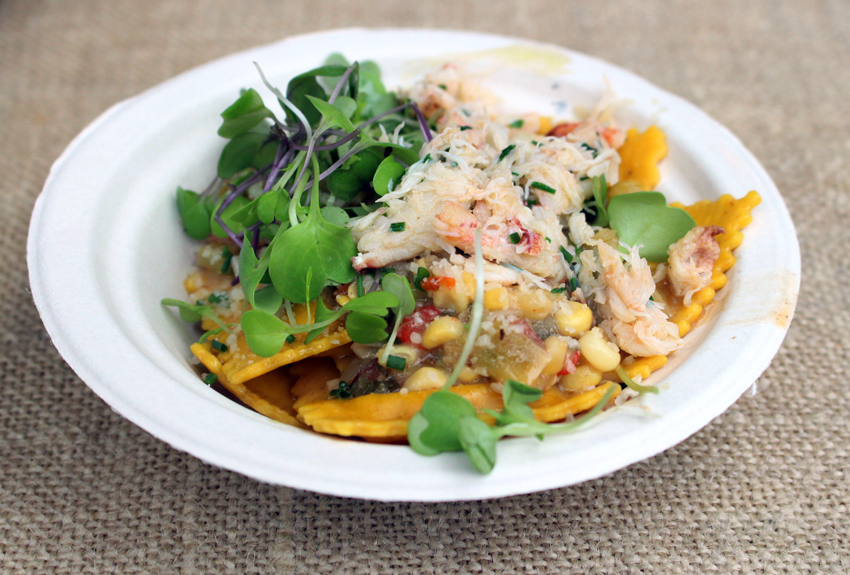
Valicenti Organico, a family farm dedicated to fresh local pasta and sauces, brought their “Pasta Farm” to the food festival with this brown butter and sage roasted sweet potato ravioli with creamy corn succotash, fresh Maine crab, and maple smoked bacon with ingredients sourced from their own farm and others in Massachusetts, Rhode Island, New Hampshire, Maine, and Vermont. Other farms brought their own farm-fresh dishes as well, highlighting each location’s unique produce.
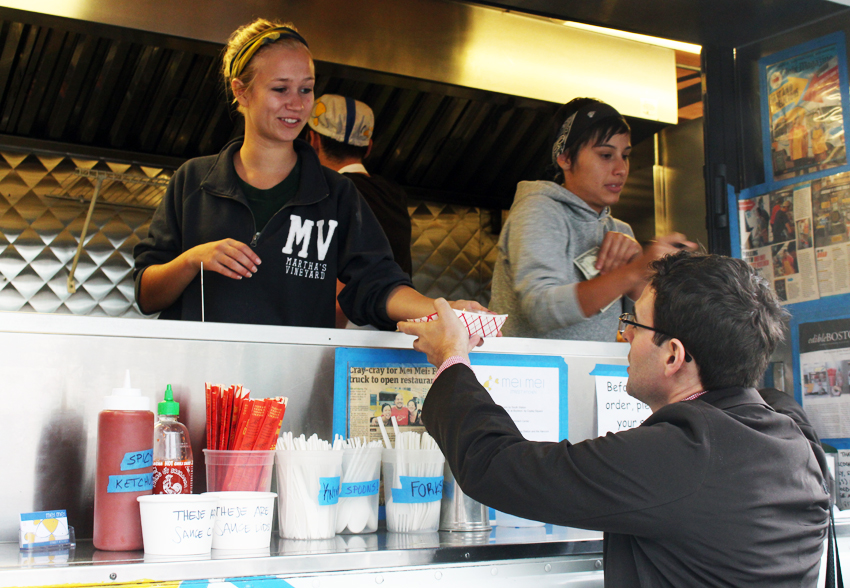
Mei Mei was one of many food trucks at the Boston Local Food Festival, along with Shuckin Truck, A4 Truck, The Chicken and Rice Guys, and Compliments Food Co., Continuously sourcing local ingredients, Mei Mei and the other vendors at the festival are committed to keeping their foods fresh and local.
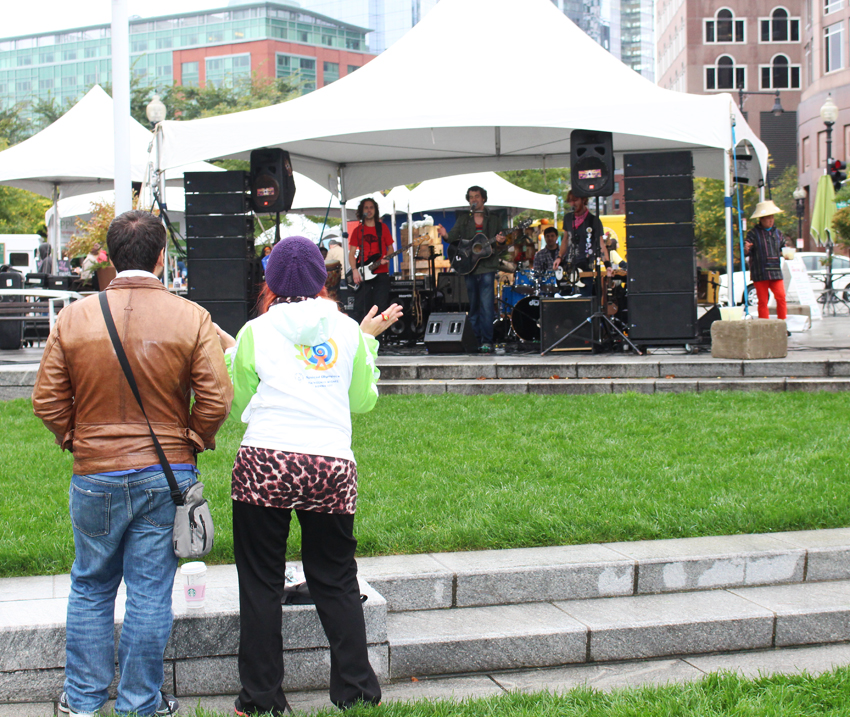
Even the music was eco-friendly, as Melodeego, a local band committed to environmental activism, used the energy of the crowds to power their performance. Festival-goers could sit at one of the bike pedals set up next to the stage and pedal along during sets, recharging the power to the band’s setup and reducing the eco-footprint of the event.

The Greenway is settled near the Boston Aquarium, which was close enough to bring a touch-tank to the event for kids to explore. Other activities in the family fun zone included a trivia wheel from Boston Collaborative for Food and Fitness, a youth chef demo from South Boston Grows, and a muffin tasting from Sproot Cooking for Kids.
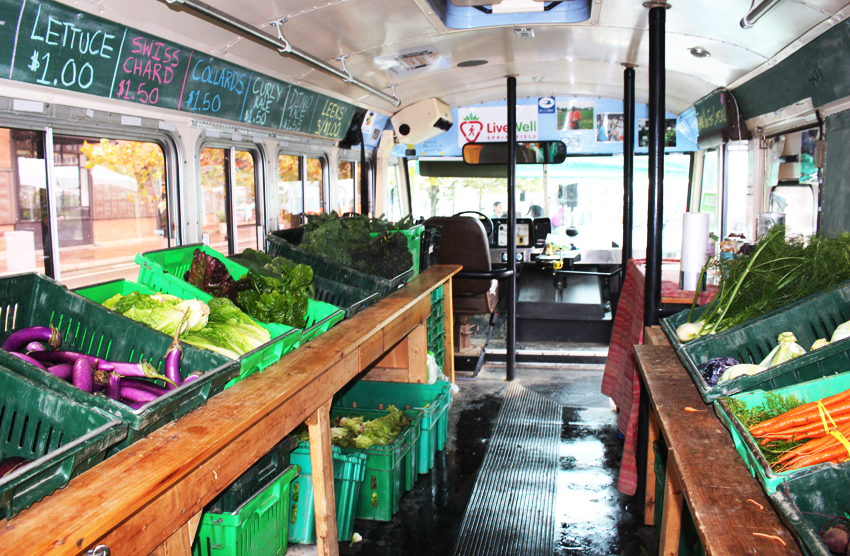
Enterprise Farm’s Mobile Market brought a farmers-market-on-wheels to the Local Food Fest, giving festival-goers a chance to sift through varieties of fresh vegetables from their 95-acre farm. A commitment to their farm-share movement, the Mobile Market was designed to bring fresh fruits and vegetables to nearby low-income neighborhoods that wouldn’t otherwise have access to this quality produce.

Orangutans took over the Greenway in support of the Rainforest Action Network’s “In Your Palm Campaign.” The movement has asked the top 20 snack food companies in the U.S. to demand for traceable palm oil—an ingredient in most snack products lining today’s grocery-store shelves—in order to ensure that their palm oil is not coming from conflict areas. Through their photo petition, supporters pose with “#InYourPalm” to raise awareness for conflict palm oil harvesting that is de-foresting the rainforest and sending orangutans into extinction.
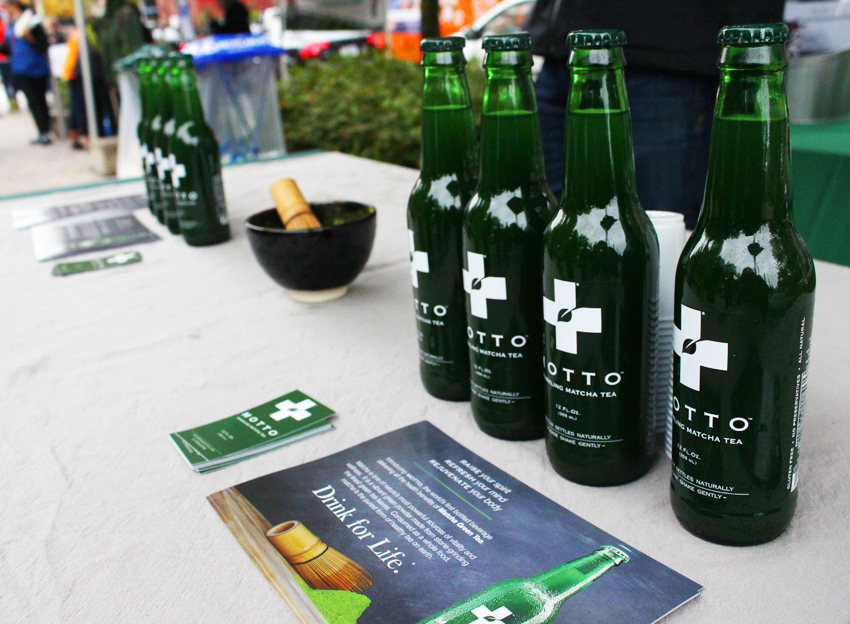
The first sparkling matcha tea, Motto is handcrafted in Massachusetts with matcha (ground green tea leaves with more antioxidants than any other natural source), apple cider vinegar, lemon juice, and sweetened with honey and organic agave, with a hint of fizz for a refreshing flavor. You can “Drink for Life” with these bottles, available at Whole Foods and other local markets.

These apple cinnamon sugar cakes, ooey-gooey apple turnovers, and pear tarts from local bakery Flour were made fresh for the event with apples from local farms. Just one of the many vendors offering locally sourced baked goods, Flour and other Boston bakeries really embraced the spirit of the Local Food Festival.

If you thought the Mobile Market was good for bringing veggies to people’s neighborhoods, then you’ll love Valley Green Feast, which brings the farmers market to your doorstep. A collaboration with Boston Collective Delivery, Valley Green Feast is different from the traditional Community Sustaining Agriculture partnerships in that there is no commitment necessary. Boston Collective Delivery bikes bring locally grown ingredients from nearby farms to your home only when you ask for them, so whether you want to sign up for the weekly deliveries or have a one-time hankering, you always have access to the freshest produce, meats, and dairy available.
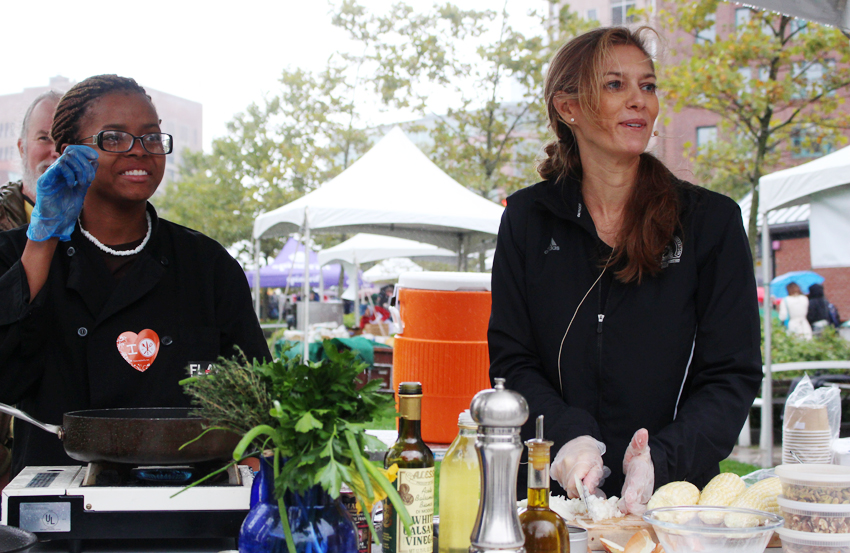
Dr. P. K. Newby (right), the self-proclaimed “Nutrition Doctor,” proved to festival-goers that healthy doesn’t mean boring. In an hourlong presentation, Newby explained that six grams of protein and fiber and 100 calories in a cup of corn went into her side dish of creamed corn with sauteed onions and fresh-cracked pepper, making for a perfect complement to her marinated and seared fish. She served this with a salad of heirloom tomatoes, which came in a variety of colors, of course, as each different color offers a different phytonutrient. The meal highlighted an ultra-nutritious Mediterranean diet with a little local flare.

And what better way to prove our local chops than with a Chowder Cook-Off? Matt Basile, chef and host of Rebel Without a Kitchen, a street-food show on the Travel and Escape network, tried his hand at chowder against Matthew Ciara, executive chef of Boston’s local Shuckin Truck, and his sous-chef, a teacher at Boston Future Chefs, an organization that prepares urban teens for life after high school or college. The positive spirit of the day continued with another tie to finish off the festival.
